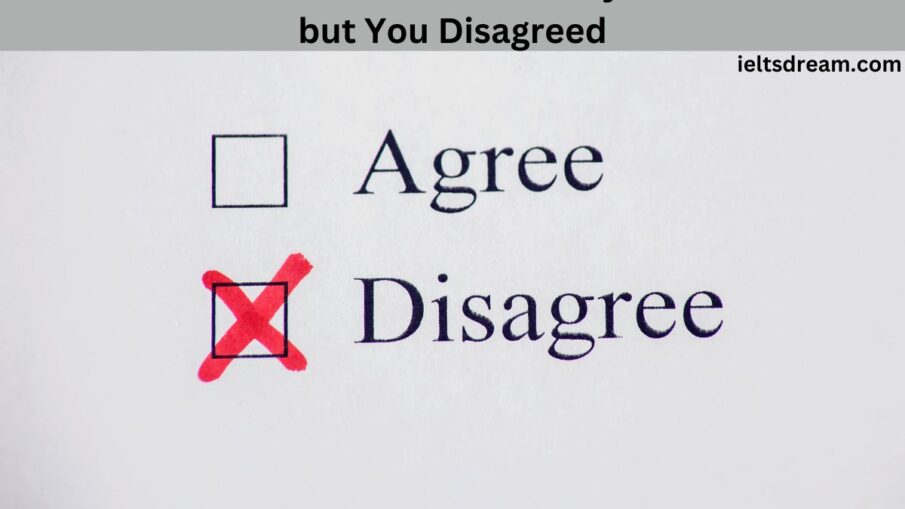Talk about a decision made by someone but you disagreed: You should say:
- What the decision was?
- How was it made?
- What you disagreed with?
- And explain why you disagreed with it.
Sample Answer: Talk About a Decision Made by Someone but You Disagreed
One decision made by someone that I disagreed with was when my close friend, Priyanka, decided to drop out of university to pursue a career in music. Priyanka had been studying engineering for two years, but she had always been passionate about music, especially soft and Sufi Punjabi music, which she loved performing. After much contemplation, she decided to leave her studies behind to fully focus on her musical career.
The decision was made after a lengthy discussion with her family and friends. She had been feeling increasingly unhappy in her engineering course, as her heart was not in it. She believed that pursuing her passion for music was the right thing to do, despite the uncertainty about her future. Her parents, while supportive, were apprehensive about her decision.
What I disagreed with was the way she handled the decision. While I understand the importance of following one’s passion, I felt that she was too impulsive in giving up her education. I disagreed with her abandoning her degree without a clear plan or backup. Although she had a strong passion for music, I was concerned about the long-term stability of her career in the highly competitive music industry. In my opinion, she could have balanced both her studies and her music, which would have given her a solid foundation for her future.
I disagreed with it because I felt that education provides a safety net, and it would have been wise for her to complete her degree before making such a significant change. I was worried that this decision could limit her future opportunities. However, she was determined, and I respected her choice, though I still believe that a more thoughtful approach could have worked better.
Follow-ups of Talk About a Decision Made by Someone but You Disagreed
Question 1:- What skills are necessary when making decisions?
Answer – When making decisions, several skills are necessary to ensure effective and thoughtful choices. Firstly, critical thinking skills are essential for analyzing information, evaluating options, and considering potential outcomes. Problem-solving skills help in identifying and resolving challenges or obstacles that may arise. Decision-making also requires strong judgment skills to assess the pros and cons of different choices. Additionally, communication and collaboration skills are important for gathering diverse perspectives and seeking input from others. Lastly, being able to manage emotions and handle uncertainty is crucial for making decisions with clarity and confidence.
Question 2:- How do you think computers will change the way people make decisions?
Answer – Computers, particularly through AI and data analysis, will revolutionize decision-making by providing faster, more accurate insights. They can process vast amounts of data, identify patterns, and suggest optimal solutions. However, human judgment will remain essential, as computers cannot fully replicate emotional intelligence or ethical considerations in complex decisions.
Question 3:- How can people improve their decision-making skills?
Answer – Improving decision-making skills is a valuable endeavour that can be achieved through various strategies. Firstly, individuals can enhance their critical thinking abilities by actively seeking out different perspectives, questioning assumptions, and analyzing information objectively. Developing problem-solving skills through practice and seeking out challenging situations can also sharpen decision-making abilities. Seeking feedback from others and learning from past decisions can provide valuable insights for future choices.
Question 4:- Do parents in India allow their children to make important decisions about the future?
Answer – In India, the level of involvement parents have in their children’s decision-making regarding the future can vary widely. Traditionally, Indian parents have played a significant role in guiding their children’s choices, particularly when it comes to education and career paths. However, in recent years, there has been a shift towards more open and collaborative decision-making, with some parents allowing their children to have greater autonomy in shaping their futures. Factors such as education, socio-economic background, and cultural norms influence the extent to which parents involve their children in important decisions about their future.
Question 5:- Do you think that parents should make important decisions for their children?
Answer – I believe parents should make important decisions for young children, especially regarding their education, health, and safety. However, as children grow older, they should be gradually involved in decision-making to develop independence and critical thinking skills. Ultimately, while guidance is essential, children should learn to make their own informed choices as they mature.


Leave a Reply